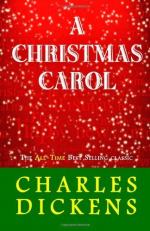|
This section contains 4,037 words (approx. 14 pages at 300 words per page) |

|
SOURCE: "The Conversion of Scrooge: A Defense of That Good Man's Motivation," in Studies in Short Fiction, Vol. III, No. 1, Fall, 1965, pp. 46-55.
In the following essay, Morris examines Ebenezer Scrooge's "conversion" in A Christmas Carol. According to Morris, "Dickens does not intend Scrooge's awakening to be a promise for all covetous old sinners, but only a possibility to be individually hoped for. "
As everyone knows, being called a "scrooge" is bad. When labeled like this, one is considered "a tight-fisted hand at the grindstone . . . Hard and sharp as flint, from which no steel had ever struck out generous fire; secret, and selfcontained, and solitary as an oyster." In reality, and in short, one is a party-pooper, afflicted with general overtones of inhumanity.
This is the popular definition of the word Scrooge, and it is unfairly the usual description of Charles Dickens' Ebenezer Scrooge, of A Christmas Carol...
|
This section contains 4,037 words (approx. 14 pages at 300 words per page) |

|


